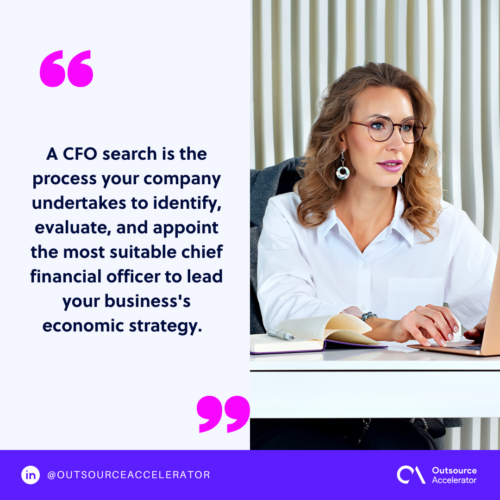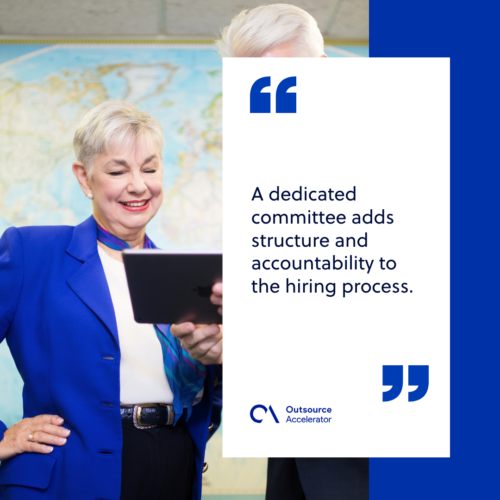CFO search: How businesses can find the right financial leader

Your company cannot afford to treat financial leadership as an afterthought—managing cash flow directly impacts every major aspect of business performance.
Without strong financial planning, decision-making becomes reactive instead of proactive. This leaves businesses vulnerable to risks such as poor budgeting and missed investment opportunities.
Your firm needs to ensure compliance, guide funding rounds, and make tough financial calls. These responsibilities demand someone with deep expertise and sharp judgment. That someone is your chief financial officer.
To find the right person for this role, you need to carry out a focused, structured, and deliberate CFO search.
What is a CFO search?
A CFO search is the process your company undertakes to identify, evaluate, and appoint the most suitable chief financial officer to lead your business’s economic strategy.
Sourcing a candidate for this role should never be rushed or treated like filling mid-level positions. Instead, it demands a thorough, rigorous approach. Look for a skilled CFO who can read financial data through a business lens.

Key qualities to look for during a CFO search
Not every seasoned finance executive qualifies as the right CFO for your organization. To ensure your CFO search delivers a transformational leader, you must focus on qualities beyond technical knowledge.
Financially strategic
A financially strategic CFO brings a broader perspective, one that connects financial data directly to business outcomes.
During your CFO search, consider giving candidates a brief exercise or scenario with two goals to achieve:
- Evaluate how well they interpret complex financial information.
- Transform financial data into insights that boost the company’s cash flow.
Ethically grounded
Work ethics should be a non-negotiable standard. Since your CFO will handle confidential financial data and make high-stakes decisions, you need someone whose integrity is unquestionable.
During your CFO search, ask about past situations where they had to make tough calls under pressure. Look for signs of transparency, sound judgment, and a clear understanding of legal and ethical boundaries.
An ethically grounded chief financial officer will not hesitate to uphold what’s right, even when it’s inconvenient or unpopular.
Investor-conscious
Fundraising efforts, shareholder engagement, and IPO planning all depend on their ability to present financial data. During your CFO search, assess how candidates speak about past interactions with investors.
Look for a professional who knows how to communicate your company’s financial story in a way that earns investor confidence.
How to start a CFO search for your firm
A successful CFO search starts with a clear understanding of your needs. Here’s a step-by-step approach to finding a proficient chief financial officer.
1. Audit your current financial operations
Start by looking at your accounting workflows, cash flow management practices, budget, and planning cycles. Are your financial statements accurate and timely? Do you have reliable forecasting models?
Then, document everything. Outline what’s working, what’s underperforming, and what’s missing entirely. Include the state of your books and the current financial KPIs being tracked.
This audit gives you a practical baseline of where your business stands and makes it easier to define what your future CFO needs to take over, fix, or improve.
2. Identify the strategic purpose of the CFO
Clearly define the strategic outcomes you expect your CFO to achieve within the first 12 to 24 months. These might include improving cash flow, transforming financial systems, or preparing for an IPO.
When the strategic purpose is well-defined, your CFO search becomes more targeted. You’ll know exactly what experience, leadership approach, and financial expertise to look for in a CFO candidate.
3. Establish a CFO search committee
Involving only your CEO or a single stakeholder creates blind spots. Form a CFO search committee that includes key department heads with financial and strategic insight.
A dedicated committee adds structure and accountability to the hiring process. It reduces bias, prevents rushed decisions, and ensures that every candidate is assessed using business-aligned criteria.

4. Determine internal vs. external search strategy
Before expanding your search, assess whether your company should consider an internal recruitment for the CFO role.
This doesn’t mean assigning the title to just anyone familiar with numbers. If no one within your organization fits the standard, an external search is necessary.
Hiring from outside opens access to professionals with diverse experience. It’s worth considering partnering with a recruitment firm that specializes in financial leadership roles.
These firms often have deep connections within industries like banking, fintech, private equity, and even government agencies such as revenue services or regulatory bodies.
5. Set up a non-disclosure agreement
Confidentiality matters. Your CFO search will involve sensitive information about your financial state, strategic goals, and operational weaknesses.
Every candidate you interview must sign a Non-Disclosure Agreement (NDA) before accessing this information.
Kickstart your CFO search and achieve financial excellence
A great CFO doesn’t just balance your books. They expand your capacity for growth and shield you from financial blind spots.
Onboard a chief financial officer who fits your company’s mission, values, and strategic vision by using the right sourcing approach. More importantly, treat your CFO search like the mission-critical business decision it is.







 Independent
Independent




